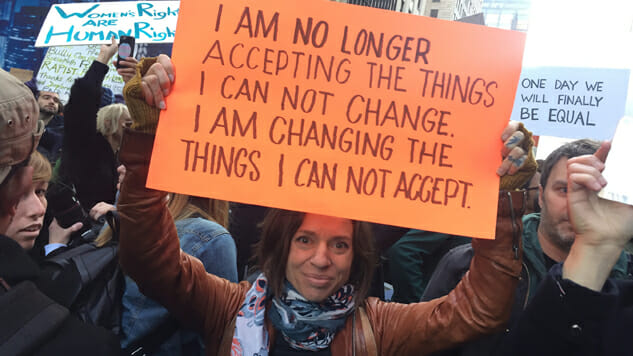The 11 Best Ani DiFranco Songs
Photo by Susan Alzner / Quote by Angela Davis
With more than 20 recorded albums of original music and countless collaborations with legends such as Prince, Bruce Cockburn, and Dar Williams, Ani DiFranco’s catalog is expansive. Both DiFranco and her music can be described as punk, honest, powerful, unapologetic, and at times, even jarring. DiFranco launched her music career at the age of 14. Four years later, she started her own label, Righteous Babe Records, which has allowed her to answer to no one but herself.
Although she has enjoyed some commercial success with songs featured in major movies, DiFranco is an indie artist at heart. Constant college tours built her a following from the ground up, and even as her music eventually reached the masses through magazine exposure and coverage on MTV and VH1, she stayed true to herself and her fanbase by remaining on her own label, which became successful enough to sign other artists such as Andrew Bird.
DiFranco’s music also embodies her commitment to social activism. Her lyrics are raw, often blunt, and she uses both her art and her platform to support causes she believes in. Most important, DiFranco offers an unabashed honesty in her music, and her fans feel connected through her intimate revelations. With all these qualities in mind, here are the 11 best Ani DiFranco songs.
11. “Swan Dive”
Nestled in the second half of DiFranco’s ninth studio album, Little Plastic Castle, “Swan Dive” is a slow and uneasy build up to a steady beat. The staccato introduction that repeats throughout the verses holds its own in contrast to the regularity of the chorus. DiFranco’s rhythmic push/pull, which mimics the lyrical dynamics, creates a palpable tension that leaves the listener cheering for the narrator, while also worrying for her safety. As DiFranco sings, “Gravity is nothing to me, I’m moving at the speed of sound, I’m just going to get my feet wet, until I drown,” one wonders if she needs permission to fly or someone to protect her from herself.
10. “Shameless”
“Shameless” appears on DiFranco’s seventh and most critically acclaimed album, Dilate. When she wrote and recorded this song in 1996, bisexuality was hardly recognized, let alone discussed in pop music. Her lyrics as always are unapologetic, and the driving beat and almost-growling delivery of the words let the listener know that DiFranco is not interested in anyone’s opinions or criticism. As she sings about coveting another man’s wife, she delivers the lines, “Just please don’t name this / Please don’t explain this / Just blame it all on me / Say I was shameless.” Ever the outsider, DiFranco offers no apologies for herself and doesn’t feel she owns anyone. This song inspired many of her contemporaries and successors to follow suit.
9. “As Is”
While DiFranco has a strong and gritty voice, she also has a softer, melodic side that shines on this track from Little Plastic Castle. The accompaniment is stripped down to acoustic guitar with light percussion and brush drums, underscoring a simple message of acceptance. Lest anyone think this song is proof that DiFranco has lost her edge, as she sweetly sings about catching her beloved in a lie, she dips back into a direct and cutting lyric: “Just give up and admit you’re an asshole / You would be in some good company.” Her almost breathy delivery shows a more vulnerable side of her voice that reminds the listener that DIFranco is still as human as ever.
8. “Garden of Simple”
In 2001, DiFranco released the double album Revelling/Reckoning. “Garden of Simple” the third track, opens with a syncopated guitar melody, played with one of DiFranco’s alternate tunings, that allows her to provide a bass line without featuring any other instruments. The double album is mostly acoustic and full of socially conscious narratives, including this retelling of a dream. All of the lyrics are written lower case, much like an E. E. Cummings poem, and while DiFranco’s signature voice conveys deeply personal lyrics, the double album looks beyond interpersonal relationships and offer her fears for the planet and society. She sings, “Science chases money and money chases its tail / And the best minds of my generation can’t make bail.” Revelling/Reckoning was released in April, just five months before September 11, and one can’t help but marvel at how prescient they really were.
7. “Angry Anymore”
This sweet American anthem opens with a melodic banjo tune that carries throughout the entire song. Sandwiched between the psychedelic “Angel Food” and the torch song “Everest” on DiFranco’s 1999 album, Up Up Up Up Up Up, “Angry Anymore” provides an uptempo inspiration to understand the motivations of those who raised us and to help us let go of our youthful baggage. DiFranco appears to side with her father in these lyrics, which would give any mother pause to hear: “But now I’ve seen both my parents / Play out the hands they were dealt / And as each year goes by / I know more about how my father must have felt.”
-

-

-

-

-

-

-

-

-

-

-

-

-

-

-

-

-

-

-

-

-

-

-

-

-

-

-

-

-

-

-

-

-

-

-

-

-

-

-

-








































